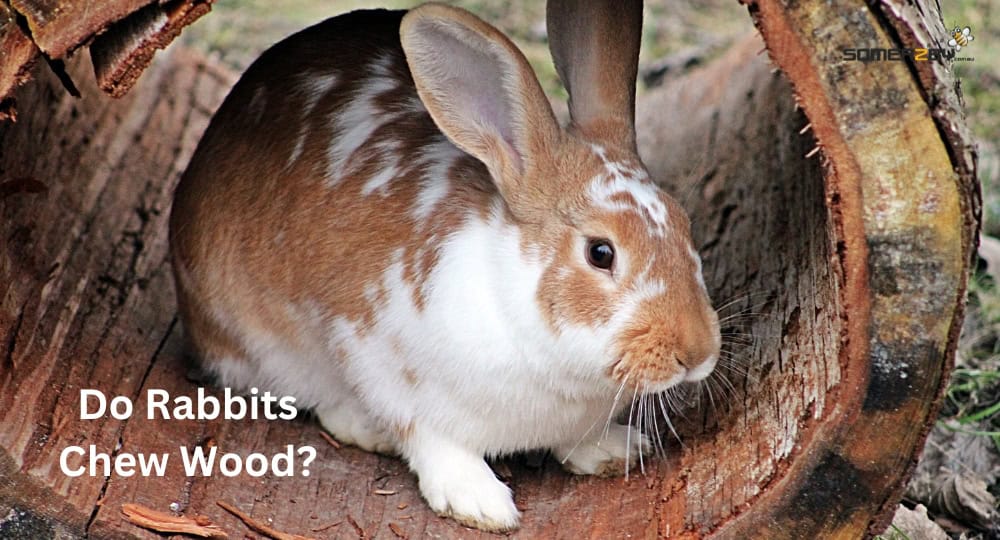Info Guides, Rabbits
Do Rabbits Chew Wood?
Rabbits love to chew on wood. It keeps them busy and is good for their teeth.
But what woods are safe for rabbits? And if your rabbit chews on something it shouldn’t, what should you do? How can you stop rabbits chewing?
Why Do Rabbits like Chewing?
Most rabbits and guinea pigs love to chew. They will chew toys, their hutch, your furniture… anything!
Usually younger bunnies will chew more than older ones. They will often chew less and less as they get older.
Rabbits who are not de-sexed will chew more than those who are desexed. Female rabbits will chew more than males.
But why do rabbits chew?
Rabbit Teeth
The main reason rabbits need to chew is to wear down their teeth.
If they don’t chew and their teeth grow too long and sharp, they can cause painful ulcers on their tongue and in their cheeks.
This is very serious and may lead to difficulty eating and related health issues.
To prevent this, supply your rabbit with a constant supply of hay and wood that is safe for rabbits.
Boredom
Another big reason rabbits like to chew is boredom or loneliness.
This can be caused by being isolated and not interacting with other rabbits or people enough.
Spend plenty of time with your bunny. Place their hutch close to your house so you can stop in and hang out with it more often.
Boredom chewing may also occur if they are inside their hutch full time and never get let out.
Let your rabbits outside of their hutch once per day for a run around and some exercise in a secure area.
Pain
If you notice your furry friend is suddenly chewing excessively, it may be in pain. Visit your local vet for a check up.
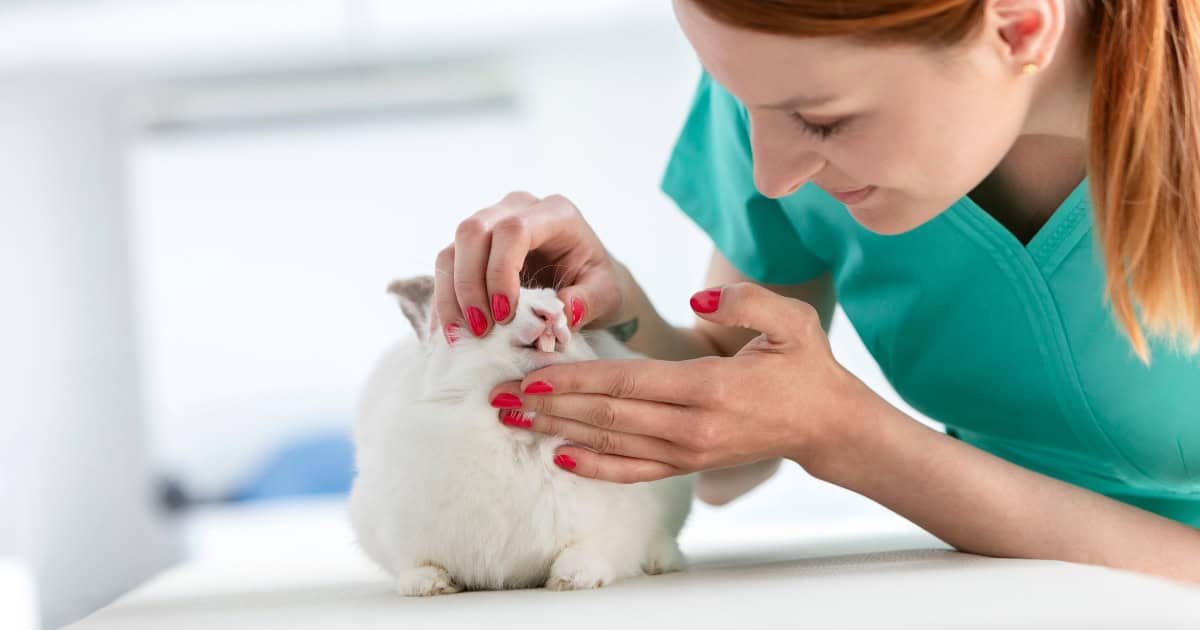
What to Give Rabbits to Chew on?
Out in nature, rabbits have lots of natural wood and bark to chew on. But as your pet, its access to these is very limited.
This means you’ll need to provide your bunny with safe wood to chew on to keep its teeth trimmed and healthy.
Different types of wood will taste differently and you may find your bunny has preferences. It is good to offer your rabbits variety to keep things interesting.
Before giving your rabbits wood to chew on, always check it is safe first to protect their health.
Safe Woods
The following types of wood are safe for your bunny:
Kiln Dried Pine
It is safe for your rabbits and guinea pigs to chew on pine wood that has been dried out in a kiln.
This means most pine chew toys, furniture or pet bedding are safe but fresh pine wood is not.
You can tell pine is fresh because it will have a much stronger smell.
This is the same with pine cones – pine cones are only safe for rabbits and guinea pigs if washed well and properly kiln dried.
Fresh pine wood or pine cones put many rabbits at risk of liver disease.
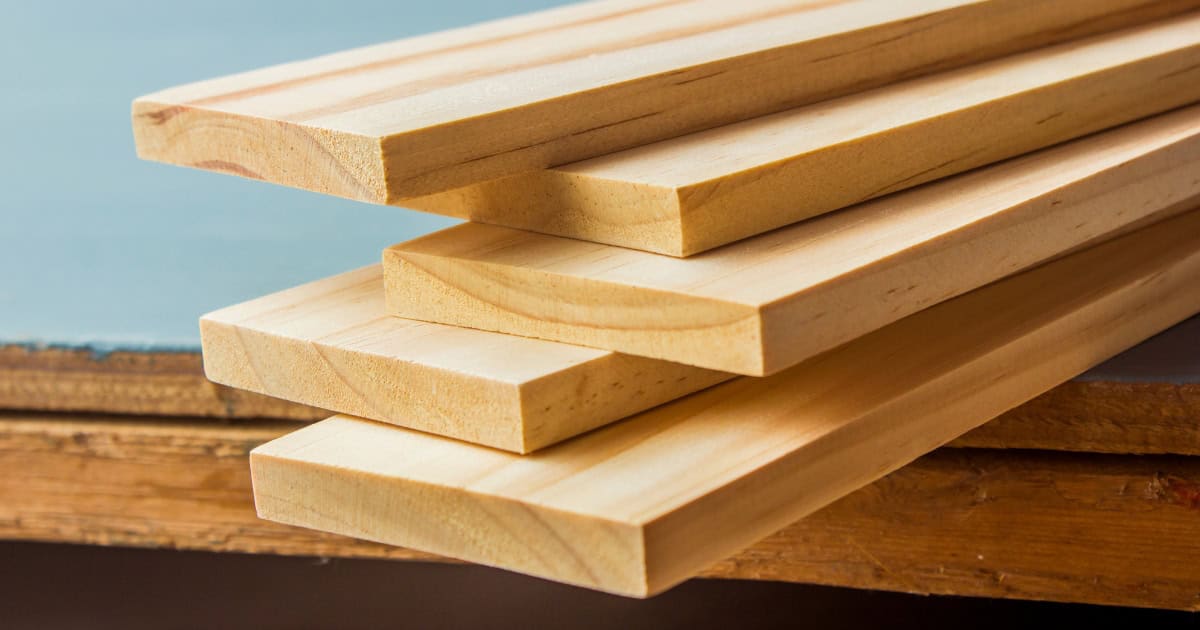
Willow
Willow tree wood is safe for your bunny to chew on.
You will often find rabbit toys sold in pet stores are made from willow, such as tunnels made from willow sticks.
Wooden furniture and wicker baskets in your home made from willow wood may not be safe for rabbits as they are often coated in dangerous chemicals such as varnish or paint.
Kiln Dried Aspen
When choosing wood for your bunny, consider kiln dried aspen. It is safe for your rabbits to chew on.
Fresh aspen is not safe and can be toxic for your pet. Always make sure it has been kiln dried properly.
It is commonly used to make rabbit litter and is sold in most pet stores.
Apple and Pear Woods
Woods, including branches and twigs, from an apple tree or pear tree are safe for your bunny to chew on.
These fruit trees are often loved by rabbits as they have a slightly sweeter taste.
Blackberry and Raspberry Bushes
It is safe to feed your rabbits blackberry and raspberry bushes. This includes stems, branches and leaves.
Your rabbits can eat them fresh but make sure you wash them first.
Your pet can also enjoy the fruit from blackberry and raspberry bushes. However, fruits are very high in sugar.
To keep your rabbits healthy, limit how much fruit you give them. These are also very juicy and messy so be prepared that your bunny will probably make a big mess in their cage and on their fur.
Rose Bushes
It is safe for rabbit owners to feed rose bushes to their bunnies. This includes stems, branches, leaves and petals.
Petals are the least healthy part so limit these and keep them as an occasional treat.
Most owners report that you don’t even need to remove the thorns. Rabbits will typically eat around the thorns without being injured.
However, if you are worried, you could remove the thorns first for them.
Balsa Wood
Balsa wood is a very soft, commercial timber commonly used for crafts.
It is safe for rabbits to chew on but is so soft that it may not be that beneficial for their teeth or last very long.
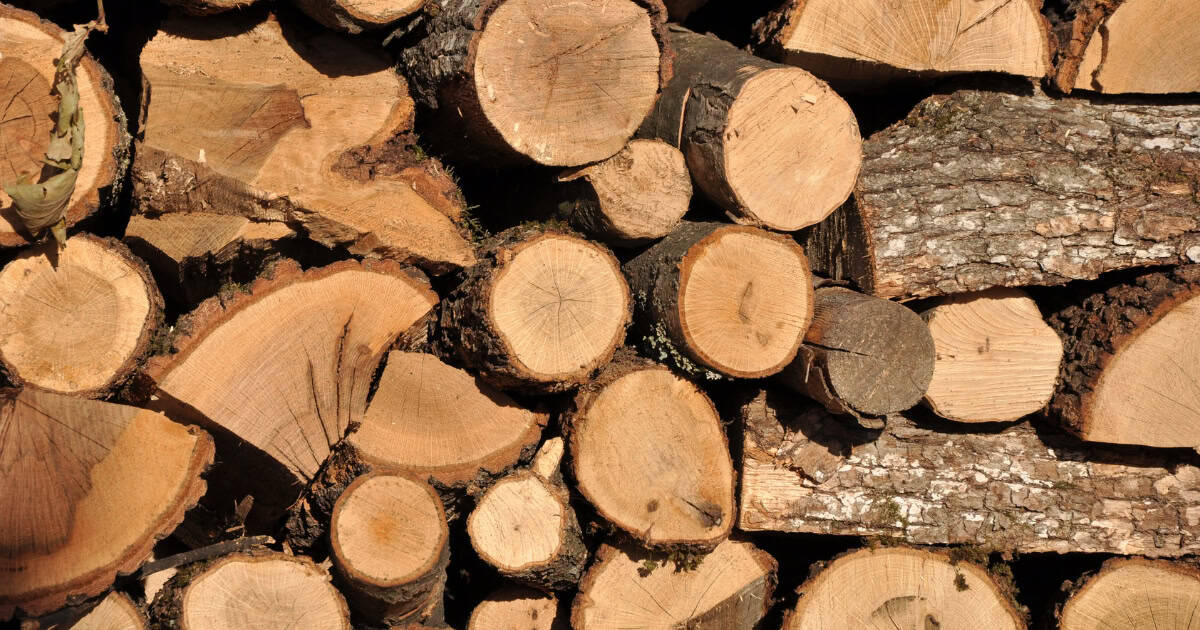
Where Can I Find Wood for my Rabbits?
You can buy safe wooden chew toys from pet supply companies, either online or in physical stores.
These are often quite expensive, especially if you have a bunny that will chew through them very quickly.
A cheaper way can be to find safe wood in your garden. If you have a rose or raspberry bush in your yard, you already have a free and safe supply of wood for your rabbits to chew.
When finding safe wood from your backyard, check first to make sure the type of wood is okay for rabbits.
Make sure it is not from a polluted area. For example, bushes right by busy roads may be absorbing toxic car fumes and other pollution.
Check it has not been sprayed with harmful chemicals including pesticides.
Check with other members of your household to make sure they haven’t sprayed the wood with anything toxic.
Next, check the wood for any insect infestations. You don’t want to be moving bugs into your rabbit’s cage.
If you have deemed a piece of wood to be safe, wash it before giving it to your bunny (just like you probably already do with your fruits and vegetables).
Unsafe and Toxic Wood
You will need to watch out that your rabbits don’t chew on unsafe or toxic wood.
Your bunny can’t tell the difference between what is safe and unsafe so it is your job, as a pet owner, to watch out for them.
Just because something is sold in a pet store or marketed for bunnies does not mean that it is really safe for rabbits.
When buying a hutch or chew toy for your rabbits, check what materials they are made from and check it is safe.
This means checking the main type of wood used, paints on the outside and excessive glue used to attach different sections.
If left to hop through your house, a pet rabbit will chew on anything.
When pet-proofing your home, assume your rabbits will chew on everything they can reach or access.
Most wooden and wicker furniture is unsafe for rabbits. It is not usually the wood itself that is the problem but the varnish, paint or dye that it is coated in.
Carpet fibers can also be hazardous for your bunny. Block off your bunny’s access to any rooms that have carpet or rugs they may chew on.
Risks
If your rabbits chews on unsafe wood, don’t panic. Wood is tough and rabbits will usually only take off a very tiny amount at a time. This is rarely enough to cause health problems.
If your bunny does chew on or eat something it shouldn’t, keep an eye on your rabbit.
Regularly check that they are eating, drinking and pooing regularly. Also check their behaviour is normal and they don’t seem lethargic or like they are in pain.
The true risk comes when your rabbit has been chewing unsafe wood for an extended period of time.
This can lead to issues with their liver or digestive system. If this happens, book in a visit with your local vet for a check up.
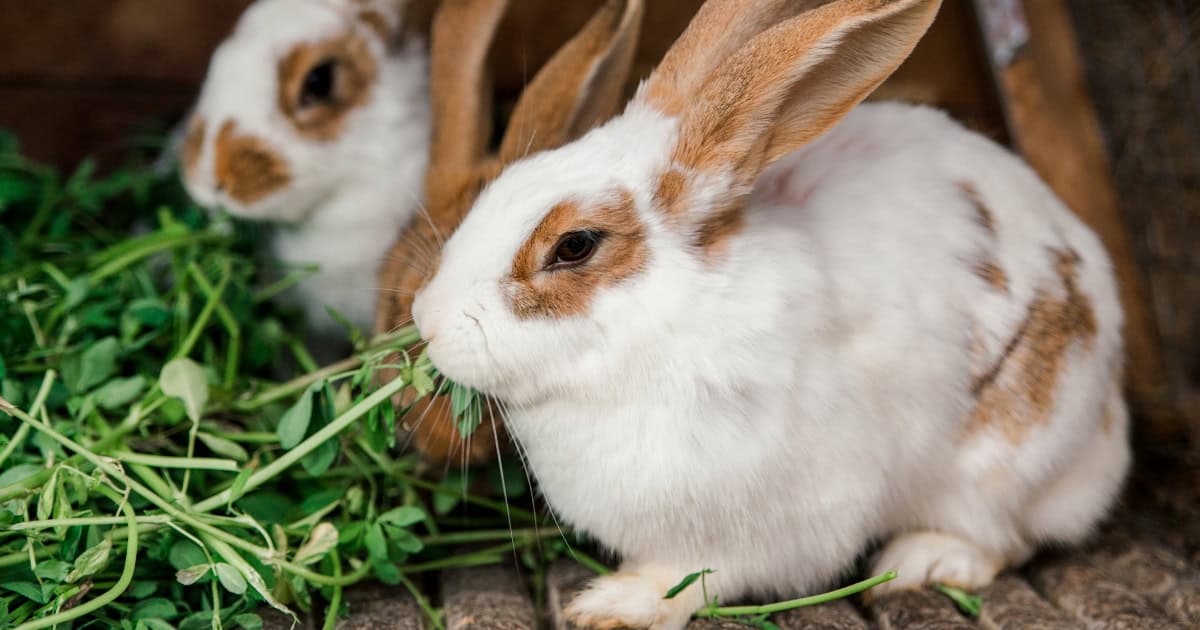
Should I be Worried if my Rabbit is Chewing its Hutch?
Somerzby rabbit hutches are made from Chinese fir timber. We chose Chinese Fir because it is naturally resistant to rot so lasts well outdoors.
The timber is not treated and comes coated in a non-toxic water-based stain. This means it is safe for your rabbit to chew on.
It is normal for your rabbit to nibble on the inside of the hutch here and there. The chewed area won’t be able to cause any major damage or structural issues.
If your rabbit likes to chew a lot and has chewed enough wood away to create a sharp edge, simply use sand paper to sand back the edge of the affected area so it isn’t sharp and can’t injure your pet.
You do not need to paint your Somerzby rabbit hutch. However, if you choose to, make sure the paint you use is non toxic and okay for your bunnies if they do nibble on it.
If you have a rabbit hutch that isn’t from Somerzby, always double check with your supplier that the wood and stain used are non-toxic and safe for your rabbit to chew on.
Preventing a Rabbit or Guinea Pig Chewing
Is your guinea pig or bunny chewing on something it shouldn’t?
Your pet has the instinct to chew and doesn’t know it is wrong. It is hard for it to understand chewing its hutch or chew toys is allowed but chewing your furniture or cables isn’t.
It can be difficult to get a small pet to stop chewing on something it shouldn’t.
However, it is important to not only protect your belongings but also to protect your bunny’s health and well being.
Blocking Access
The first step to stop a rabbit chewing is removing or covering anything you don’t want chewed.
If your rabbit is chewing furniture or cables in your house, cover them up so your rabbit can’t access them.
An easy way would be using cable ties to add extra slats of wood or sheets of metal over the area you don’t want chewed.
If this isn’t possible, block off your rabbit’s access to these areas using a playpen.
Give Them Something Else to Chew
The next step to stop rabbits chewing is to provide them with something else to chew on instead.
Your rabbit is chewing for a reason, usually to wear down its teeth. So if you take away the thing it is chewing, you should replace it with something else that is more suitable.
You could provide your rabbit with an appropriate chew toy or some safe pieces of wood.
Also make sure you provide your bunny with constant access to hay. Rabbits chew on hay all day long and most days can eat their own body weight in hay!
Boredom
If your bunny is chewing because it is bored, you may be able to prevent chewing by providing it with mental stimulation.
You could hide treats throughout the hutch for your bunny to find or add in toys for them to play with.
You can make toys at home for free. Simply cut openings in cardboard boxes and turn them upside down to create a tunnel.
Or stuff hay inside of a toilet roll so it is a challenge to get out. Rotate toys regularly to keep things exciting.
Another good way to provide mental stimulation is letting your bunny out of its hutch daily to exercise and play together.
It doesn’t matter if it is indoors or outdoors, as long as your pet is supervised and protected from any danger. As little as 15 minutes per day can make a huge difference.
Training
You may be able to train your rabbit not to chew using positive reinforcement techniques. When your rabbit does the right thing, praise it with a gentle pat or a food reward.
Remember that you have a rabbit, not a dog. They can be very difficult to train and will need to be re-trained regularly.
Never use negative reinforcement to punish your rabbit. Yelling will only make your rabbit scared of you.
It won’t necessarily learn anything or draw a connection between you making scary, loud noises and its bad behaviour.
Anti-chew sprays can be purchased online and sprayed onto the area you don’t want chewed.
These make it taste bitter and unpleasant for your rabbit. You will need to apply regularly.
This seems like an easy fix to help your bunnies understand however these apparently have a very low success rate so may end up being a waste of money.




